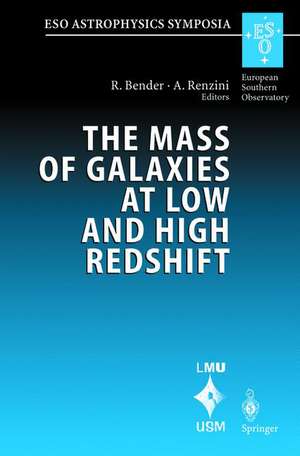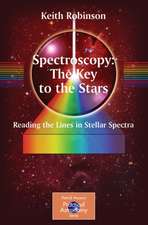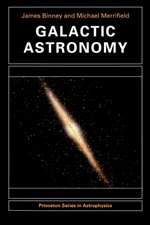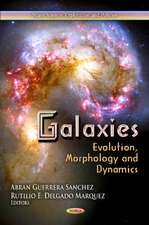The Mass of Galaxies at Low and High Redshift: Proceedings of the European Southern Observatory and Universitäts-Sternwarte München Workshop Held in Venice, Italy, 24-26 October 2001: ESO Astrophysics Symposia
Editat de Ralf Bender, Alvio Renzinien Limba Engleză Hardback – 23 ian 2003
This book reviews current techniques to measure the baryonic (stellar) and dark masses of nearby galaxies, and focusses on ongoing attempts to measure these same quantities in galaxies at higher and higher redshifts. It also gives room to future perspectives, with special emphasis on new survey projects and satellite missions.
| Toate formatele și edițiile | Preț | Express |
|---|---|---|
| Paperback (1) | 345.82 lei 39-44 zile | |
| Springer Berlin, Heidelberg – 9 dec 2010 | 345.82 lei 39-44 zile | |
| Hardback (1) | 431.30 lei 6-8 săpt. | |
| Springer Berlin, Heidelberg – 23 ian 2003 | 431.30 lei 6-8 săpt. |
Din seria ESO Astrophysics Symposia
- 15%
 Preț: 656.43 lei
Preț: 656.43 lei - 15%
 Preț: 656.10 lei
Preț: 656.10 lei -
 Preț: 369.78 lei
Preț: 369.78 lei -
 Preț: 404.51 lei
Preț: 404.51 lei - 15%
 Preț: 644.95 lei
Preț: 644.95 lei - 15%
 Preț: 656.43 lei
Preț: 656.43 lei -
 Preț: 391.97 lei
Preț: 391.97 lei - 18%
 Preț: 971.01 lei
Preț: 971.01 lei -
 Preț: 434.94 lei
Preț: 434.94 lei - 15%
 Preț: 650.86 lei
Preț: 650.86 lei -
 Preț: 402.98 lei
Preț: 402.98 lei -
 Preț: 403.90 lei
Preț: 403.90 lei -
 Preț: 412.78 lei
Preț: 412.78 lei - 15%
 Preț: 645.47 lei
Preț: 645.47 lei - 15%
 Preț: 649.06 lei
Preț: 649.06 lei -
 Preț: 402.56 lei
Preț: 402.56 lei - 15%
 Preț: 647.27 lei
Preț: 647.27 lei -
 Preț: 413.15 lei
Preț: 413.15 lei -
 Preț: 409.30 lei
Preț: 409.30 lei -
 Preț: 430.10 lei
Preț: 430.10 lei -
 Preț: 406.42 lei
Preț: 406.42 lei - 15%
 Preț: 658.05 lei
Preț: 658.05 lei - 20%
 Preț: 590.37 lei
Preț: 590.37 lei -
 Preț: 400.65 lei
Preț: 400.65 lei -
 Preț: 413.15 lei
Preț: 413.15 lei - 15%
 Preț: 658.70 lei
Preț: 658.70 lei -
 Preț: 401.79 lei
Preț: 401.79 lei -
 Preț: 436.70 lei
Preț: 436.70 lei -
 Preț: 404.13 lei
Preț: 404.13 lei
Preț: 431.30 lei
Nou
Puncte Express: 647
Preț estimativ în valută:
82.53€ • 86.41$ • 68.45£
82.53€ • 86.41$ • 68.45£
Carte tipărită la comandă
Livrare economică 10-24 aprilie
Preluare comenzi: 021 569.72.76
Specificații
ISBN-13: 9783540002055
ISBN-10: 3540002057
Pagini: 388
Ilustrații: XXII, 363 p.
Dimensiuni: 155 x 235 x 29 mm
Greutate: 0.66 kg
Ediția:2003
Editura: Springer Berlin, Heidelberg
Colecția Springer
Seria ESO Astrophysics Symposia
Locul publicării:Berlin, Heidelberg, Germany
ISBN-10: 3540002057
Pagini: 388
Ilustrații: XXII, 363 p.
Dimensiuni: 155 x 235 x 29 mm
Greutate: 0.66 kg
Ediția:2003
Editura: Springer Berlin, Heidelberg
Colecția Springer
Seria ESO Astrophysics Symposia
Locul publicării:Berlin, Heidelberg, Germany
Public țintă
ResearchCuprins
From the Contents: The Mass of the Milky Way.- Distant Field BHB Stars and the Mass of the Milky Way.- A Pattern Speed in the Galaxy's OH/IR Stars.- Dark Matter in the Local Group: The Dark Haloes of the Milky Way, M31 and the Draco dSph.- First Evidence for an Extended Dark Halo in the Draco Dwarf Spheroidal.- The Inner Halo of the Draco dSph.- Mass/Light Variations with Environment.- On the Black Hole - Bulge Mass Relation in Active and Inactive Galaxies.- The 2MASS Luminosity, Velocity, and Mass Functions of Galaxies.- Estimating the Mass of Local Disk Galaxies from the NIR Luminosity.- Galaxy Masses: Disks and Their Halos.- Dark Matter in the Center of LSB and Dwarf Galaxies from Halpha Observations.- Galaxy Systems in Low Density Environment: The NGC 4756 System.- The Masses of Dwarf Elliptical Galaxies: First Results from an ESO Large Program.- Estimating the Masses of Dwarf Ellipticals: First VLT Results.- Dynamical Masses of Elliptical Galaxies.
Textul de pe ultima copertă
Measuring the masses of galaxies as a function of redshift is perhaps one of the most challenging open issues in current astronomical research. The evolution of the baryonic and dark matter components of galaxies is not only a critical test of the hierarchical formation paradigm, but ultimately also provides new clues on the complex interplay between star formation, the cooling and heating of gas and galaxy merging processes.
This book reviews current techniques to measure the baryonic (stellar) and dark masses of nearby galaxies, and focusses on ongoing attempts to measure theses same quantities in galaxies at higher and higher redshifts. It also gives room to future perspectives, with special emphasis on new survey projects and satellite missions.
This book reviews current techniques to measure the baryonic (stellar) and dark masses of nearby galaxies, and focusses on ongoing attempts to measure theses same quantities in galaxies at higher and higher redshifts. It also gives room to future perspectives, with special emphasis on new survey projects and satellite missions.











